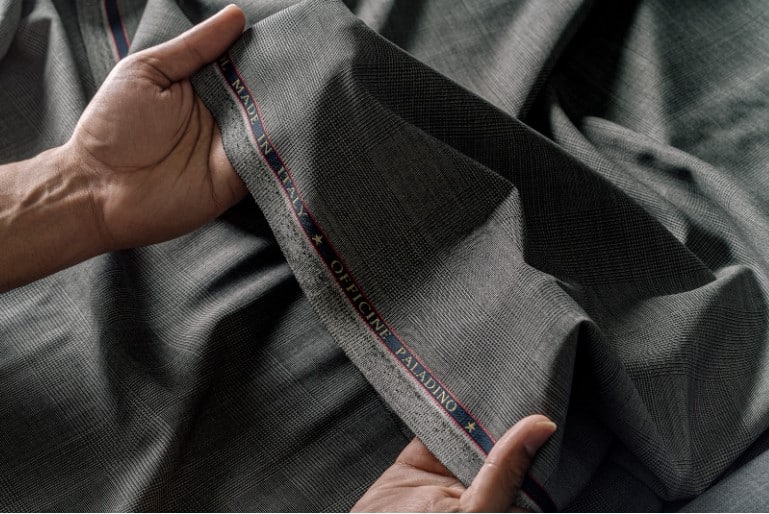The best fabric for suits is wool or wool blends, as they are durable, wrinkle-resistant, and have a natural drape. These fabrics also provide excellent insulation, making them ideal for both warm and cold weather.
Suits are a wardrobe staple for any fashion-conscious individual. Whether you’re dressing up for a formal occasion or heading to the office, a well-tailored suit can make you look and feel confident. However, choosing the right fabric for your suit is crucial in ensuring its longevity and comfort.
While there are several fabrics available, including cotton, linen, and silk, wool and wool blends are the most popular choices. Wool is known for its durability, wrinkle-resistance, and natural drape, making it perfect for a suit that needs to withstand daily wear and tear. Additionally, wool provides excellent insulation, keeping you warm in colder weather and cool in warmer temperatures. We’ll explore the benefits of wool and wool blends and why they make the best fabrics for suits.

Credit: www.dmarge.com
Table of Contents
- The Importance Of Choosing The Right Suit Fabric
- Wool: The Quintessential Suit Fabric
- Cotton: Lightweight And Versatile
- Silk Suits: Elegance And Sheen
- Linen: Perfect For Warm Weather
- Synthetic Fabrics: Modern Innovations
- Blended Fabrics: Best Of Both Worlds
- How To Choose: Factors To Consider When Selecting Suit Fabric
- Care And Maintenance: Keeping Your Suit In Prime Condition
- Frequently Asked Questions
- Conclusion
The Importance Of Choosing The Right Suit Fabric
The Importance of Choosing the Right Suit Fabric
Impact On Comfort And Appearance
Selecting the right suit fabric is crucial for both comfort and appearance.
Durability And Maintenance Considerations
Consider the durability and maintenance of the fabric when choosing a suit.
Wool: The Quintessential Suit Fabric
When it comes to suits, one fabric stands out as the quintessential choice – wool. Known for its unparalleled quality and versatility, wool has been the go-to fabric for suit making for centuries. From its varieties to seasonal types, wool offers a wide range of options to suit every occasion and climate.
Varieties Of Wool: From Merino To Cashmere
Wool comes in various varieties, each with its unique characteristics. One of the most popular types is Merino wool, known for its fine texture and excellent breathability. Its ability to regulate body temperature makes it ideal for year-round wear.
Another luxurious wool variety is Cashmere, prized for its incredible softness and warmth. Made from the fine undercoat of cashmere goats, this fabric is perfect for colder climates and adds a touch of elegance to any suit.
Seasonal Wool Types: Tweed For Winter, Tropical For Summer
When it comes to choosing the right wool fabric for different seasons, two types stand out: tweed and tropical wool.
Tweed, with its dense and heavy composition, is an excellent choice for winter suits. Its ability to trap heat and provide insulation makes it perfect for colder temperatures. Additionally, the unique texture and patterns of tweed add a touch of sophistication to any winter ensemble.
On the other hand, tropical wool is the ideal fabric for summer suits. Lightweight and breathable, this fabric allows air to flow freely, keeping you cool and comfortable even in the hottest weather. Its natural wrinkle resistance ensures you maintain a sharp and polished look throughout the day.
Overall, wool is undoubtedly the quintessential fabric for suits, offering a wide range of options to suit every taste, climate, and occasion. Whether you opt for the fine texture of Merino wool or the luxurious softness of Cashmere, or choose between tweed for winter or tropical wool for summer, you can’t go wrong with the timeless elegance and versatility of wool.
Cotton: Lightweight And Versatile
Cotton fabric is a popular choice for suits due to its lightweight and versatile nature. It offers breathability and comfort, making it an ideal option for various occasions and seasons. Whether you’re aiming for a casual or formal look, a cotton suit can effortlessly meet your style needs.
Cotton Suit Styles: Casual To Formal
When it comes to cotton suit styles, there’s a wide range to choose from, catering to both casual and formal settings. From the laid-back appeal of a cotton twill suit to the refined elegance of a cotton poplin suit, the versatility of cotton fabric allows for diverse styling options.
Caring For Cotton: Ensuring Longevity
Caring for cotton suits is essential to ensure their longevity. Follow these simple tips to maintain the quality of your cotton suit:
- Avoid machine washing and opt for dry cleaning to preserve the fabric
- Hang the suit on wooden or padded hangers to maintain its shape
- Store the suit in a breathable garment bag to prevent dust and moisture accumulation

Credit: officinepaladino.com
Silk Suits: Elegance And Sheen
Silk suits are renowned for their timeless elegance and luxurious sheen. The exquisite fabric has long been associated with sophistication and refinement, making it a popular choice for formal and special occasion wear.
Benefits Of Silk: Comfort And Prestige
Silk fabric is cherished for its remarkable comfort, boasting a natural temperature-regulating property that keeps the wearer cool in warm weather and warm in cooler temperatures. The inherent prestige associated with silk suits adds an air of exclusivity and opulence to any ensemble, making them a coveted choice for discerning individuals.
Drawbacks: Cost And Care Requirements
However, the luxurious nature of silk comes with a price tag to match. The cost of silk suits can be significantly higher than those made from other fabrics, which may deter budget-conscious shoppers. Additionally, silk requires delicate care, often necessitating professional dry cleaning and careful handling to maintain its lustrous appearance over time.
Linen: Perfect For Warm Weather
Linen is the perfect choice for warm weather suits, offering breathability and lightweight comfort. This natural fabric allows for better air circulation, making it an ideal option to stay cool and stylish during the summer months.
When it comes to selecting the best fabric for suits, linen is an ideal choice for warm weather. Linen is a light and breathable fabric that keeps you cool and comfortable, making it perfect for summer weddings, outdoor events, and beach parties.
Linen’s Breathability And Texture
Linen is a natural fabric that is made from the fibers of the flax plant. This fabric is highly breathable and allows air to circulate freely, making it an excellent choice for hot and humid climates. Linen’s texture is another reason why it is perfect for warm weather. It has an open weave that allows your skin to breathe, making it less likely to stick to your body and feel uncomfortable.
Embracing Wrinkles: The Linen Look
Linen is a fabric that embraces wrinkles and creases, giving it a unique and casual look. It is perfect for those who prefer a relaxed and effortless style. The wrinkles and creases in linen are part of its charm, and you can embrace them by wearing linen suits, shirts, and pants. If you prefer a more polished look, you can opt for a linen blend fabric, which combines the best of both worlds.
In conclusion, linen is a perfect fabric for suits in warm weather. It is breathable, lightweight, and has a unique texture that keeps you comfortable in hot and humid climates. Linen’s wrinkles and creases give it a relaxed and effortless look, making it perfect for casual events and gatherings.
Synthetic Fabrics: Modern Innovations
For decades, wool has been the preferred fabric for suits. However, with modern advancements in technology, synthetic fabrics have become a popular alternative. Synthetic fabrics offer a range of benefits, including affordability, wrinkle-resistance, and water resistance. In this article, we will explore the best synthetic fabrics for suits, including polyester and blends, and performance fabrics.
Polyester And Blends: Affordable And Wrinkle-resistant
Polyester is a popular synthetic fabric for suits due to its affordability and wrinkle-resistance. It’s a versatile fabric that can be blended with other materials like wool, cotton, and rayon to create a more durable and comfortable suit. Polyester suits are great for people who travel frequently since they are wrinkle-resistant and can be packed easily without fear of creasing.
Moreover, polyester is a breathable fabric, which means that it can help regulate body temperature during the summer months. The only downside of polyester is that it can be prone to pilling, which can make the suit look worn out after several washes. However, this can be prevented by choosing a higher quality polyester blend.
Performance Fabrics: Stretch And Water Resistance
Performance fabrics are a relatively new innovation in the world of suit fabrics. These fabrics are designed to offer more comfort, flexibility, and durability. One of the most popular performance fabrics is a blend of polyester and spandex, which offers stretch and flexibility. These suits are perfect for people who have an active lifestyle and need a suit that can keep up with them.
Another popular performance fabric is a blend of polyester and nylon, which offers water resistance. These suits are perfect for people who live in areas with frequent rain or snow. These suits are also great for people who travel frequently since they can keep the wearer dry and comfortable during long flights or train rides.
| Fabric Type | Pros | Cons |
|---|---|---|
| Polyester | Affordable, wrinkle-resistant, breathable | Prone to pilling |
| Polyester blends | Durable, comfortable, versatile | Can be prone to pilling if low quality |
| Polyester-spandex blends | Stretchy, flexible, comfortable | May not be suitable for formal occasions |
| Polyester-nylon blends | Water-resistant, durable, comfortable | May not be suitable for hot weather |
Overall, synthetic fabrics are a great alternative to wool for suits. They offer a range of benefits, including affordability, wrinkle-resistance, and water resistance. Polyester and blends are great for people who want an affordable and durable suit, while performance fabrics are perfect for people with an active lifestyle or who live in areas with frequent rain or snow.
Blended Fabrics: Best Of Both Worlds
Blended fabrics offer the best of both natural and synthetic fibers, combining the desirable qualities of each to create a versatile and durable material. These fabrics are becoming increasingly popular for suits due to their ability to provide comfort, breathability, and resistance to wrinkles and creases, making them a practical choice for everyday wear.
Combining Natural And Synthetic Fibers
Blended fabrics are created by combining natural fibers, such as wool, with synthetic fibers like polyester or silk. This combination results in a fabric that retains the superior characteristics of the natural fiber while benefiting from the added strength, durability, and easy care of the synthetic fiber.
Popular Blends: Wool-polyester And Wool-silk
Two of the most popular blended fabrics for suits are wool-polyester and wool-silk. Wool-polyester blends offer excellent crease resistance and shape retention, making them ideal for regular wear. On the other hand, wool-silk blends provide a luxurious feel and a lustrous appearance, making them suitable for more formal occasions.

Credit: www.contrado.com
How To Choose: Factors To Consider When Selecting Suit Fabric
When it comes to selecting the right fabric for your suit, there are several important factors to consider. The fabric of your suit can greatly impact its comfort, durability, and overall appearance. By taking into account the climate, occasion, and your personal style and comfort preferences, you can make an informed decision that suits your needs.
Climate And Seasonal Needs
Consider the climate of your location and the seasonal needs when choosing the fabric for your suit. For warmer climates, lightweight and breathable fabrics such as cotton or linen are ideal. In cooler climates, wool and wool blends provide warmth and insulation.
Occasion And Dress Code
When selecting suit fabric, it’s essential to consider the occasion and dress code. For formal events and professional settings, fine wool fabrics are a classic choice. For more casual occasions, such as outdoor gatherings or relaxed work environments, cotton or linen blends can offer a more relaxed yet polished look.
Personal Style And Comfort Preferences
Your personal style and comfort preferences play a significant role in choosing suit fabric. If you prefer a luxurious look and feel, consider fabrics like silk or cashmere blends. Additionally, take into account your comfort level with certain fabrics, as some may be more prone to wrinkling or require higher maintenance.
Care And Maintenance: Keeping Your Suit In Prime Condition
Proper care and maintenance are essential for keeping your suit in pristine condition. By following a few simple tips, you can ensure that your suit not only looks great but also lasts for years to come. From routine cleaning and storage to professional tailoring and repairs, let’s explore the best practices for maintaining your suit.
Routine Cleaning And Storage Tips
Regular cleaning and proper storage are crucial for preserving the quality and longevity of your suit. Here are some tips to keep in mind:
- Dry Cleaning: Always follow the care instructions provided by the manufacturer. Most suits require dry cleaning to remove dirt, stains, and odors. Choose a reputable dry cleaner who specializes in handling suits.
- Spot Cleaning: If you notice a small stain or spill on your suit, act quickly to prevent it from setting. Gently blot the affected area with a clean cloth or towel, avoiding any rubbing or scrubbing that could damage the fabric.
- Steam Refreshing: Instead of frequent dry cleaning, consider using a garment steamer to refresh your suit. Steaming helps remove wrinkles and odors without subjecting the fabric to harsh chemicals.
- Hanging: Store your suit on a sturdy wooden or padded hanger to maintain its shape. Avoid wire hangers, as they can cause creases or distort the shoulders. Hang the suit in a well-ventilated closet to prevent musty odors.
- Brushing: Use a soft-bristled clothes brush to remove surface dust and lint from your suit. Brush in gentle downward strokes to avoid damaging the fabric.
Professional Tailoring And Repairs
Even the highest-quality suit may require occasional tailoring and repairs to ensure a perfect fit and address any wear and tear. Here are some reasons to consider professional assistance:
- Alterations: If your suit feels too loose or tight, consult a professional tailor to make the necessary alterations. They can adjust the waist, hem, sleeves, or any other areas to achieve an impeccable fit.
- Repairing Damages: Whether it’s a loose button, a small tear, or a broken zipper, prompt repairs can prevent further damage to your suit. Trust an experienced tailor to fix these issues without compromising the overall appearance.
- Restyling: If you want to update the look of your suit or transform it into a different style, a skilled tailor can help you achieve the desired changes while maintaining the integrity of the original garment.
By adhering to these care and maintenance tips, you can keep your suit in prime condition and ensure that it remains a reliable and stylish addition to your wardrobe for years to come.
Frequently Asked Questions
What Is The Best Fabric For A Suit?
The best fabric for a suit is typically wool. It is durable, breathable, and has a natural drape. Additionally, wool suits are versatile and suitable for various occasions.
What Material Are Luxury Suits Made Of?
Luxury suits are typically made of high-quality materials such as fine wool, silk, cashmere, or a blend of these fabrics. These materials are chosen for their durability, luxurious feel, and ability to drape well on the body, creating a polished and sophisticated look.
What Are The Most Expensive Fabrics For Suit?
The most expensive fabrics for suits include vicuña wool, qiviut, and guanaco wool. Vicuña wool is from the vicuña, a rare South American animal, and is known for its softness and warmth. Qiviut is from the muskox and is prized for its softness and durability.
Guanaco wool is from the guanaco, a South American camelid, and is known for its fine texture.
Is A Cotton Or Wool Suit Better?
A cotton suit is better for warmer weather, as it is lightweight and breathable. A wool suit is better for cooler weather, as it is warmer and more durable. The choice depends on your personal preference, the weather, and the occasion.
Read Next:
Conclusion
To sum up, choosing the best fabric for suits is crucial in achieving a stylish and comfortable look. From the timeless elegance of wool to the lightweight and breathable qualities of cotton, there are various options to suit different preferences and occasions.
By considering factors such as durability, breathability, and personal style, you can make an informed decision that will ensure your suit not only looks great but also stands the test of time. So, take your time, explore different fabrics, and find the perfect match for your suit that will make you look and feel your best.
